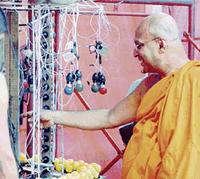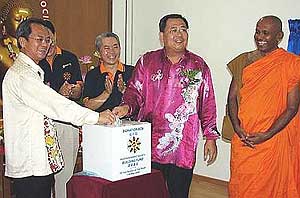Song "Brahma of my heart" performed by i-Gemz, The Buddhist Channel, May 29, 2008
It was in January of 2002, that songwriter Khoo Nee Wern invited Daniel Kwok to join him and his friends from BGF's Incovar to form the band known as i.gemz. The name of the band was coined as a spin-off from members of Incovar who enjoy singing, songwriting, dancing and performing original musical works. Back then, there were no plans to record an album. The i.gemz was a group of Kalyana Mittas who shared the love for good music and the passion to push the boundaries for more meaningful and contemporary Buddhist music.
As a result of i.gemz's growing popularity, the band of singers and performers was soon joined by
talented songwriters Toh Anson and Khoo Nee Sern. Together, fresh new songs were written and played during camps, the musical Pujas and other Buddhist concerts. By 2003, they have started to perform in many Buddhist temples by invitation with a simple minus-one recording for 5 of their more popular songs. Many Buddhist youths and fans had already memorised the simple lyrics and catchy tunes of i.gemz, and sang these songs during their camps and youth meetings. Everyone asked i.gemz the same question, "You guys are like the new Wayfarers. So, when is i.gemz coming up with your own album?"
By 2004, i.gemz have compiled enough songs for 2 albums. With the encouragement and backing from BGF's President, Datuk Dr Victor Wee, the band recorded their first demo album on a cassette. With the noisy demo tape during their free time, they searched high and low for a suitable sound engineer to produce their album. During this time, i.gemz also searched for new singers by conducting auditions at BGF.
It took i.gemz nearly 18 months to record their debut album, "Cradled In Buddha's Arms". In December 2005, i.gemz launched their album to an overwhelming crowd at BGF hall. Since then the group has been performing in various local Buddhist gatherings, and recently at the United Nations Conference Centre in Bangkok Thailand during the International Buddhist Conference on Wesak Day 2006; and also at Malacca's Wisma SKH in April 2006 during Echoes of Buddhism #1 there.
The i.gemz team regularly meet for practices and continues to experiment and write new songs. They continue to live up to their motto, "We Inspire Through Music", by performing and singing from their hearts as regularly as they can. And what they received in return is even more important: ... the inspiration and gratitude from their fans and the Buddhist Community in Malaysia and around the world.
For pictorial stories on the adventures of the i.gemz, please visit their blog @ http://igemz.blogspot.com.












